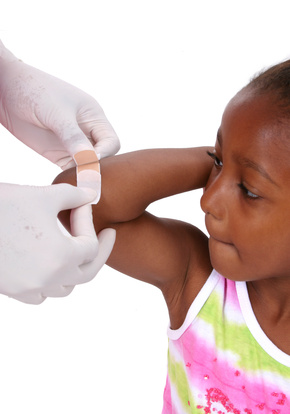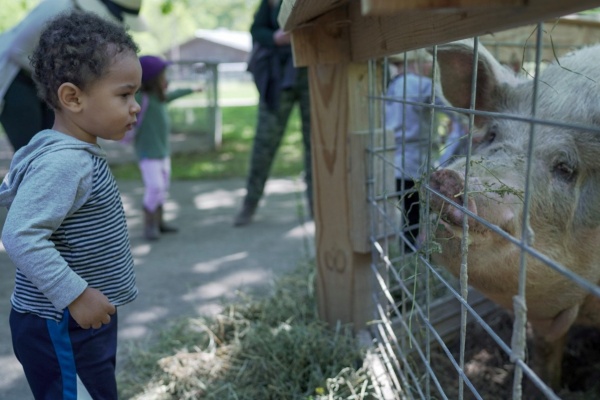
More Than Band-Aids: What School Nurses Do for You
 There are some places kids just don’t want to be at school:
There are some places kids just don’t want to be at school:
- The principal’s office. 2. Indoors at recess. 3. The nurse’s office.
While I can’t help much with #1 or #2, there’s certainly nothing to fear about #3. In fact, the nurse might just be a pretty nice person who actually enjoys seeing kids when they’re healthy.
“Nurses LOVE to meet students as soon as possible,” said Lisa Harnacker, the Parkway School District’s health services manager, via e-mail. “It is always helpful to meet the younger child, who might be a little shy or cautious of the school nurse, as well as the older child who might be more verbal and able to care for himself.
“At any age, getting to know your school nurse is important so a positive relationship can begin as soon as possible,” continued Harnacker, who oversees all the district’s school nurses. “Children who do not necessarily have a specific health concern should also stop by and meet the nurse. She is there for ALL students!”
Of course, students with a medical condition that could impact their school day – food allergies, asthma or the need for medication to be taken during school hours – are one of school nurse’s priorities. Richelle S. Clark, manager of the Office of Health Services at St. Louis Public Schools, said it’s important that not only nurses but other staff members get to know these children, both by name and by face.
“The students who have the life-threatening allergies will also be introduced to the cafeteria staff if it is a food allergy,” Clark said via e-mail, “and all students who need to take medications during the school day must be introduced to the trained designated medication givers who assist students in the absence of the school nurse.”
In addition to getting to know the student, Clark and Harnacker said, school nurses also prefer to get to know the parents. This is the time of year when parents should be putting together the paperwork their child’s school needs and scheduling a meeting.
Clark explained how the process usually works: “The parent/guardian would bring the appropriate action plan from the prescribing physician and/or primary care provider stating the specific condition (asthma, sickle cell disease, diabetes, life-threatening allergy, seizure disorder, etc) and any other directions for medications that must be administered during the regular school day and any other accommodations that must be provided.
“They would then have a one on one discussion with the school nurse about all the information,” she went on. “When the students are old enough … and certainly if they are going to self-carry their medication, they must participate in the conversation. Parents/guardians should also bring in an updated physical exam report each year to help with the development of the individual student health plan.”
However, for families who haven’t been through the process before, this can be daunting. “We find that often parents are unaware of what type of paperwork or ‘order’ from the physician is necessary,” Harnacker said, “so parents should feel free to contact their building RN and ask!” And if parents aren’t able to make it to school to meet in person, “with the use of technology, forms can be emailed or faxed, so conversations can occur over the phone.”
Both Clark and Harnacker emphasized the extreme care their school districts place on confidentiality of records, accuracy of treatment, and sharing of information between the schools and the physicians. Details of the exact routines vary by school − and if you’re concerned about yours you should definitely ask − but the examples I received from these two districts about training, protocols and medication storage procedures are reassuringly thorough.
So, you might be asking, what do school nurses do for children without specific health conditions? Their job extends to diverse areas including physical exams (yes, someone does actually look at those after you send them in!), preventive care, health insurance, medical homes, sick-child care, head lice, immunizations and much more.
When asked how parents can best support the school nurses’ work, Clark and Harnacker responded that parents need to provide updated contact information, especially home and cell phone numbers and e-mail addresses where you or an emergency contact can be reached during the school day.
They also suggested that parents:
- Read the district’s medication policy. Harnacker – clearly speaking from experience – said, “We are not trying to be difficult by not giving a child something for a headache; we cannot by law give any medication without a physician’s order."
- Share tips about their child. “For example, if your child has difficulty taking medication and needs to take something daily at school, let us know what works best for you at home, so we might do the same,” Harnacker said.
- Show their child where the health office is located, especially if the child is attending a new school.
- Avoid spreading germs. “Always keep a child home from school if the child is sick in the morning before coming to school and if the child had been sick the day before,” Clark advised. “When a child is kept home due to any illness, a phone call should be placed to the school and the information given directly to the school nurse.”
- Make sure their student(s) have a physical exam each year. Clark explained, “This gives the physician an opportunity to not only keep the child appropriately immunized, but offer opportunities for assessing normal growth and development, offer anticipatory guidance, and provide early identification and treatment of concerns because there is a comprehensive record that has baselines of information from the child’s previous visits.”
- Sign up for health insurance, if they aren’t already. “If they need help with this, they should schedule a meeting with the school nurse to learn about the health care insurance available for all children living in Missouri that are uninsured or under-insured,” Clark said. “Once the child has health insurance, each needs a ‘dedicated medical home.’ This can be either a private physician or a community health center, but it needs to be the primary site where the child receives medical care.”
- Turn in any immunizations or updates of medical records as they occur. “We love to keep our records up to date,” Harnacker said.
- Get involved! Each St. Louis Public School has a School Health Advisory Committee (SHAC) that is headed by the nurse and physical education teacher and includes parent members. Within Project Parkway, the health and wellness subcommittee has many parent members.
By Amy De La Hunt, Health Blogger for SmartParenting

Amy De La Hunt is a journalist and editor who lives in the St. Louis metro area and works across the country as a writer, copy editor, project manager and editorial consultant on everything from fiction books to monthly magazines to blog posts. When she's not chauffeuring her teenage sons to activities, Amy is an enthusiastic amateur cook, landscaper, Latin dancer and traveler. Follow Amy on Instagram @amy_in_words





















